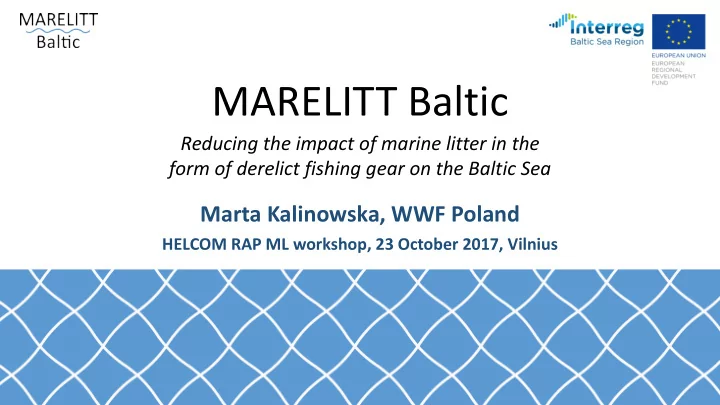

MARELITT Baltic Reducing the impact of marine litter in the form of derelict fishing gear on the Baltic Sea Marta Kalinowska, WWF Poland HELCOM RAP ML workshop, 23 October 2017, Vilnius
HELCOM Regional Action Plan on Marine Litter Action RS 6 on best practice in relation to ALDFG and derelict fishing gear and their removal Action RS 7 on best practices to reduce the input of ALDFG from commercial and recreational fishing Action RS 10 mapping of snagging sites or historic dumping grounds Action RS 11 identification of accumulation areas, initiate removal of ghost nets and their safe management on land Action RS 12 on partnership with organizations to encourage implementation of passive Fishing for Litter schemes
Budget and partners The projects total budget is EUR 3,8 MM. Lead partner: Municipality of Simrishamn, Sweden – Keep the Estonian Sea Tidy – WWF Poland Foundation – WWF Germany – Keep Sweden Tidy – Maritime University of Szczecin – Kolobrzeg Fish Producers Group – Institue of Logistics and Warehousing – Estonian Divers Association
Project aims Increased institutional capacity in the Baltic sea region to solve the ghost fishing problem. – Improve reception facilities in harbours and environmentally sound waste management. – Develop cost-efficient, safe and environmentally derelict fishing gear cleaning methods. – Produce a handbook on derelict fishing gear methodologies consisting of evaluation of dragging operations and documentation of lessons learned. – Establish a baseline for future cleaning measures and a map over the host areas in the Baltic Sea and a plan for post-project operation. – Increase responsible fishery while developing a code of conduct for the fishing industry .
Key questions Why are fishing gears lost? How can we minimize the reasons for gear loss? Where can we find the DFG? How can we retrieve them? How can we reuse or recycle them? What does that cost? Who is/are responsible?
Workplans: WP 2 Cleaning, WP 3 Preventing and WP 4 Recycling
Baltic interactive map Fishing effort Sediment types DFG Hot-spots
Environmental impact assessment Guideline for or against retrieval actions in each specific situation General results: - Leaving DFG in the marine environment is expected to have a higher impact on the marine ecosystem than the retrieval operations as carried out by MARELITT Baltic. - The major impacts are ghostfishing/bycatch and introduction of marine litter, including microlitter, into the Baltic sea environment.
WP 2 Preliminary/interim Results of DFG search and retrieval in 2017 Hours spent at sea PL 420h, SE 1172h, EE 79h, DE 143h Amounts of retrieved ghost nets PL 2804kg, SE ca 6000kg, EE 89kg, DE 495kg
Preliminary/interim Results from WP 3: Preventing Our findings show regional differences – why fishing gears get lost – changes of fishing effort The gained information suggest that frequency of gear loss is lower today
Preliminary/interim Results from WP 4: Waste management Fifty fishing harbours were visited – 33 % of the participating harbours do not have enough containers suitable for the separate collection of waste at the harbour – 38 % of all investigated harbours only have the most basic reception facilities available An independent unique assessment scale from one to four In average 53% of the harbours selected for participation in the survey scored 3 or 4 during the assessment. Survey presents 10 Recommendations
Preliminary/interim Results from WP 4: Waste management • recycling pathways are being developed, including plastic re-use through granulation as well as polymer re-use as raw oil (pyrolysis) or synthetic gas (hydrolysis) • high contamination of derelict fishing gear with lead from sink lines hinders direct re-use of plastics, as lead has to be removed
What’s next?
Follow the project on www.marelittbaltic.eu and on social media #MarlittBaltic Subscribe to our newsletter for the latest updates
Thank you for your attention! mkalinowska@wwf.pl
Recommend
More recommend